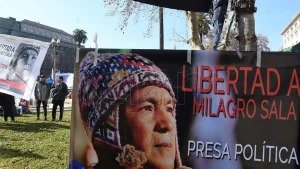
A banner at a protest in support of Milagro Sala reads "Freedom for Milagro Sala, Political Prisoner" next to a photo of her. Photo: Telam.

Orinoco Tribune – News and opinion pieces about Venezuela and beyond
From Venezuela and made by Venezuelan Chavistas

A banner at a protest in support of Milagro Sala reads "Freedom for Milagro Sala, Political Prisoner" next to a photo of her. Photo: Telam.
The first witness of the trial against Milagro Sala that began this week in Argentina confesses that he was forced to testify against the social leader.
A person who was called as a witness in the new trial against the Argentine activist and social leader Milagro Sala—which began this Thursday—confessed that he was pressured by the Public Ministry of Jujuy province to testify against the indigenous activist.
The new trial for a case that originally dates back to 2009 and that had already been closed in 2012, was announced in March this year when a witness, identified as “Pilo Mancilla,” accused Sala of instigation to steal a court file.
After that accustaion, the Criminal Court No. 3 of Jujuy started another trial against Milagro Sala, lawyer Antonio Bellido and court employee Marcos Romero for the alleged “extraction and destruction” of a provincial Justice file in December 2009.
RELATED CONTENT: Lawfare as an Imperialist Weapon: The Case of the Venezuelan Plane
Quisieron extorsionar al testigo pero no pudieron!
El testigo que llevaron para denunciar al abogado de Milagro Sala dijo que lo extorsionaron!
La mafia judicial de Jujuy que responde a Gerardo Morales intenta comprar voluntades para condenar a Milagro Sala! pic.twitter.com/7CSwo320Cc
— Walter Ariel San Lorenzo (@walter_ariel15) August 19, 2022
The new witness, who testified this Friday, August 19, said before the court that last week he was pressured by the head of the Public Ministry for Accusation (MPA), Sergio Lello Sánchez, an official loyal to the governor of Jujuy, Gerardo Morales, to “make good statements.”
According to the message the witness received, “making good statements” meant compromising at least one of the defendants, Alberto Bellido, who at the time was a lawyer for the Túpac Amaru organization.
In exchange, the witness was promised that he would be given back his job, from where he was fired a little over three years ago, and he would also be given the wages that he did not receive during these three years. The man’s real name is José Luis Ruiz and today he is homeless.
The witness confessed that he had received these offers from the secretaries of Attorney Osinaga y Rondón, Attorney Juan Carlos Dávalos and Attorney Joaquín Campos, all under the command of Sergio Lello Sánchez. He also referred to police harassment caused by Gerardo Morales.
Milagro Sala, leader of the indigenous organization Túpac Amaru, participated in the trial via video-conference as she is convalescing from a health problem. When consulted by court Judge María Nallar, she refrained from testifying.
Bellido’s lawyer, Juan Cabezas, requested that Ruiz’s statement be investigated “as possible extortion or bribery by an official of the Public Ministry for Accusation.”
Milagro Sala’s defense pointed out that in the new trial initiated against the social leader “it was revealed how the all the judicial processes constitute an operation” carried out by the justice system of the province of Jujuy, as in the first hearing of the process a witness accused that the prosecution made him an offer in exchange for accusing one of the defendants.
The process in question refers to the alleged “extraction and destruction” of a file of the Jujuy judiciary in 2009, in which Sala is accused of being the “direct determiner” of the matter together with court employee Marcos Romero, who is accused of having seized the file in an action planned with the intervention of a third defendant, lawyer Alberto Bellido.
As this judicial process continues, several media outlets have launched a coordinated smear campaign against Milagro Sala, accusing her of money laundering.
Sala has been in prison since 2016 and has been accused of dozens of crimes, some of them related to alleged offenses against the governor of Jujuy, Gerardo Morales. The judicial campaign against the social leader has been criticized by activists, social organizations and human rights groups.
In January 2019, Sala was sentenced to 13 years in prison by the Criminal Court No. 3 of Jujuy for alleged fraud against the public administration of Jujuy and extortion for the diversion of 60 million pesos from the state, funds that were intended for the construction of social housing.
(Telesur)
Translation: Orinoco Tribune
OT/JRE/SC